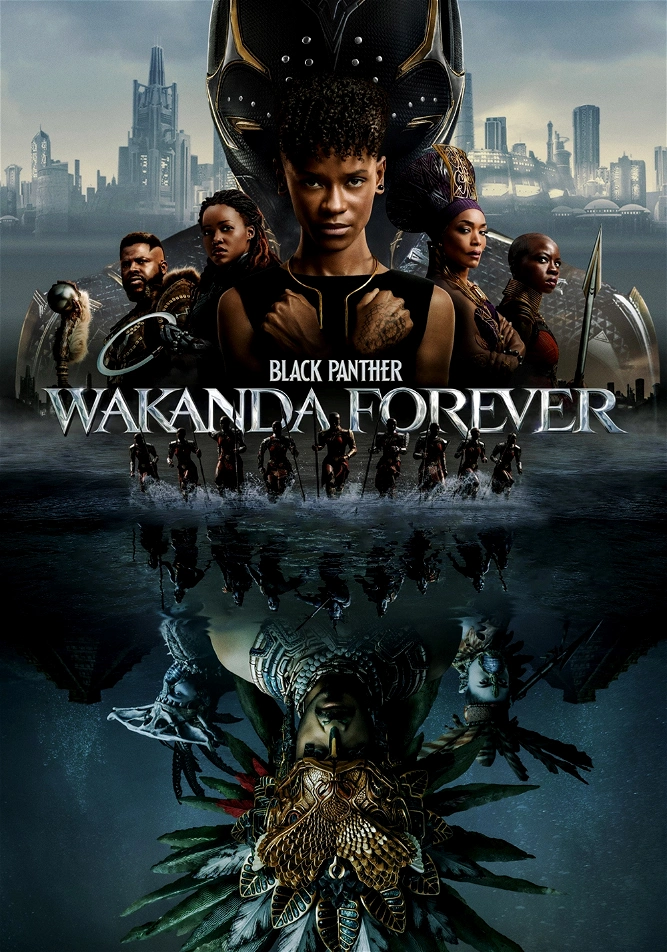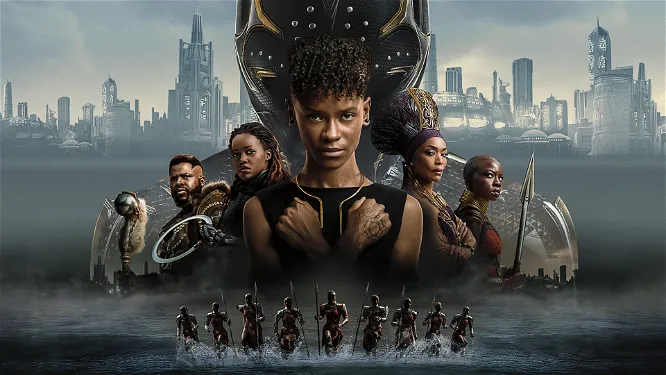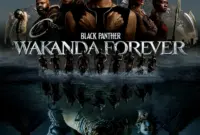Black Panther: Wakanda Forever (2022) stands as a heartfelt and powerful entry in the Marvel Cinematic Universe, blending action, tradition, and emotion. As fans eagerly awaited its release, Black Panther: Wakanda Forever not only honored the legacy of the late Chadwick Boseman but also introduced new narratives that expanded the world of Wakanda and its place in the MCU.
Table of Contents
Introduction
When Marvel Studios announced the continuation of the Black Panther saga with Black Panther: Wakanda Forever (2022), fans around the globe anticipated an emotional yet action-packed tribute to the late Chadwick Boseman. The task was monumental: to honor a legend, expand Wakanda’s rich lore, and push the Marvel Cinematic Universe (MCU) forward. Director Ryan Coogler delivered a visually stunning, emotionally resonant film that stands out even in Marvel’s extensive catalog.
In this deep dive, we explore every aspect of Black Panther: Wakanda Forever, from its development and themes to character arcs, cultural significance, critical reception, and hidden details that casual viewers might have missed.
The Legacy of Chadwick Boseman

Chadwick Boseman’s portrayal of King T’Challa was nothing short of iconic. Following his untimely passing in 2020, Marvel faced a sensitive challenge: how to proceed without recasting the role. Black Panther: Wakanda Forever became a tribute, emphasizing loss, resilience, and hope. The film captures the grief of Wakanda’s citizens, mirroring the mourning of fans worldwide.
Rather than focusing on T’Challa’s replacement, the story centered on the emotional journey of the characters he left behind, especially Shuri (Letitia Wright), Queen Ramonda (Angela Bassett), and Okoye (Danai Gurira).
Development and Production Journey
After the success of the first Black Panther film in 2018, a sequel was inevitable. However, the loss of Chadwick Boseman forced Marvel and director Ryan Coogler to rethink the storyline entirely. Kevin Feige, president of Marvel Studios, confirmed that Boseman’s role would not be recast out of respect for his memory.
Instead, the script underwent major revisions to focus on themes of grief, succession, and resilience. Filming locations included Atlanta, Georgia, and Puerto Rico, providing stunning backdrops that expanded the visual identity of Wakanda and introduced new underwater worlds associated with Namor.
Plot Summary: What Happens in Black Panther: Wakanda Forever?
Black Panther: Wakanda Forever opens with Shuri desperately trying to recreate the Heart-Shaped Herb to save her brother, King T’Challa, who is suffering from a mysterious illness. Tragically, she fails, and Wakanda mourns their king.
A year later, Queen Ramonda leads Wakanda in defending its resources, especially Vibranium, from global powers who seek to exploit the nation’s perceived vulnerability. However, a new threat emerges: Namor (Tenoch Huerta), the ruler of the underwater kingdom Talokan. Namor proposes an alliance against the surface world but threatens war when Wakanda refuses.
As tensions rise, Shuri must confront her grief, her doubts, and her destiny. Through emotional trials and epic battles, she ultimately embraces the mantle of the Black Panther.
Key Plot Points:
- Shuri and Riri Williams (Ironheart) forge a crucial bond.
- The discovery of Talokan as a new powerful civilization.
- Queen Ramonda’s sacrifice during Namor’s assault on Wakanda.
- Shuri’s journey of vengeance and eventual peace.
- The revelation of T’Challa’s son, Toussaint, at the end of the movie.
See Also
- The Electric State: A Complete Guide to the 2025 Sci-Fi Adventure
- Captain America Brave New World (2025): Full Review, Cast, Storyline, and More
Major Characters and Performances
Shuri (Letitia Wright)
Stepping into the spotlight, Shuri transforms from a tech genius to a national leader. Letitia Wright’s performance is layered with vulnerability, anger, and eventual wisdom, showcasing the difficult path of grief.
Queen Ramonda (Angela Bassett)
Angela Bassett delivers a powerhouse performance, commanding every scene she’s in. Her portrayal of a grieving mother and sovereign earned her critical acclaim, even sparking awards buzz.
Namor (Tenoch Huerta)
Namor introduces audiences to Talokan, a civilization inspired by Mesoamerican culture. Tenoch Huerta gives Namor depth, portraying him as both a sympathetic protector and a ruthless leader.
Riri Williams (Dominique Thorne)
Riri, aka Ironheart, brings a youthful, brilliant energy to the story, bridging the gap between Wakanda and the larger Marvel Universe. Her future in the MCU looks bright.
Okoye and M’Baku
Danai Gurira’s Okoye and Winston Duke’s M’Baku continue to provide strength, humor, and heart, reinforcing the community dynamics of Wakanda.
Cultural Significance of Black Panther: Wakanda Forever
Black Panther: Wakanda Forever doesn’t just entertain; it continues to reshape Hollywood’s representation of Black and indigenous cultures. The film respectfully explores African traditions, grief, leadership, and introduces Mesoamerican influences through Talokan’s rich mythology.
The introduction of Namor and Talokan highlights parallels between the historical experiences of colonization and cultural survival, expanding the MCU’s diversity authentically.
Visuals and Cinematography
Cinematographer Autumn Durald Arkapaw, stepping in after Rachel Morrison’s work on the first film, brings a lush, painterly quality to every frame. The underwater scenes in Talokan are breathtaking, offering a stark contrast to Wakanda’s sun-drenched beauty.
Costume design by Ruth E. Carter and the production design team deepen the worldbuilding, with Talokan’s aesthetics inspired by ancient Mesoamerican civilizations like the Mayans.
Soundtrack and Score
Music is a vital emotional engine in Black Panther: Wakanda Forever. The soundtrack, curated by Ludwig Göransson, blends African and Latin American influences, featuring artists like Rihanna, whose song “Lift Me Up” became an anthem for the film’s themes of mourning and hope.
The score’s haunting melodies perfectly accompany the film’s epic battles and quieter, grief-stricken moments.
Themes and Messages
- Grief and Healing: Wakanda’s mourning process mirrors real-world grief, making the film deeply relatable.
- Legacy: The question of who should carry the Black Panther mantle reflects broader issues of inheritance and leadership.
- Cultural Identity: Talokan and Wakanda’s clash represents different strategies of cultural survival.
- Resilience: Despite enormous losses, the characters rise stronger, embodying hope and perseverance.
Box Office Success and Reception
Black Panther: Wakanda Forever debuted to a powerful $181 million domestic opening, the biggest November debut ever at the time. Internationally, it grossed over $850 million, proving the enduring appeal of the Black Panther franchise.
Critics praised the film for its emotional weight, stellar performances, and visual beauty. Fans appreciated how the story honored Chadwick Boseman while organically introducing new heroes and threats.
Ratings:
- IMDb: 6.7/10
- Rotten Tomatoes: 84% (Critics), 94% (Audience)
- Metacritic: 67/100
Behind the Scenes: Fun Facts and Easter Eggs
- The underwater scenes were filmed with actors suspended in special rigs to simulate swimming.
- Namor’s winged ankles are inspired directly from the comics.
- A subtle homage to Killmonger (Michael B. Jordan) appears when Shuri visits the ancestral plane.
- Toussaint’s reveal hints at future Black Panther storylines.
Critical Analysis
While Black Panther: Wakanda Forever is a triumph, it’s not without its criticisms. Some viewers found the pacing slow in the middle act. Others wished for more exploration of Namor’s backstory. However, the emotional richness and visual splendor more than compensate for minor flaws.
Shuri’s emotional arc feels authentic and grounded, giving the superhero genre a rare exploration of personal loss and growth.
Future of Black Panther in the MCU
The mid-credits scene featuring T’Challa’s son suggests a hopeful future. With the next generation of heroes like Riri Williams and Toussaint on the horizon, Wakanda’s legacy is in safe hands.
Rumors suggest future spin-offs exploring Okoye’s Dora Milaje and Namor’s Talokan, further expanding this fascinating corner of the MCU.
Conclusion
Black Panther: Wakanda Forever (2022) is more than just another Marvel movie; it’s a powerful meditation on grief, culture, and the enduring power of legacy. By honoring Chadwick Boseman while forging new paths for beloved characters, it succeeds in being both a satisfying sequel and a heartfelt tribute.
As the MCU continues to evolve, Black Panther: Wakanda Forever remains a shining example of storytelling that resonates across cultures and generations.
Source and Reference
IMDB, https://www.imdb.com/title/tt9114286


